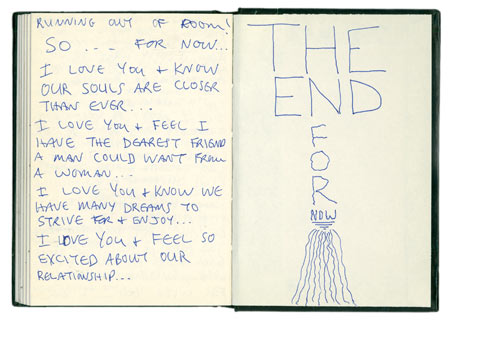Intimate Rare Look Into the Thoughts and Photos of World-Renowned Photojournalist Ed Kashi, While on Assignment
While photojournalist Ed Kashi has been traveling the world making amazing photographs for publications such as National Geographic, he has also been building a family. Leading almost a dual life, spending roughly half the year on the road, Kashi credits the strength of his wife, filmmaker Julie Winokur, shown below with their two children, for keeping their home life working while he is away.
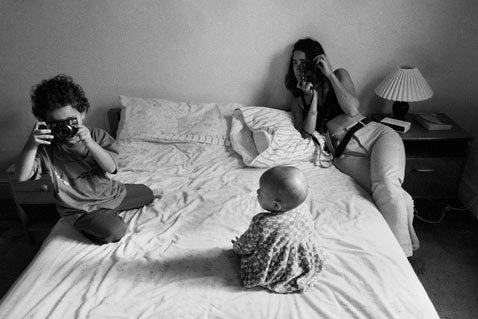
All photographs by Ed Kashi/VII Photo
"If I hadn't met someone as incredible as Julie, I would've ended up like most of my colleagues-divorced or alone. I am lucky…I can't imagine not having them to come home to."
To stay close to his family while away, Kashi writes daily journal entries to his wife, sharing private thoughts of his experiences, triumphs and trials. In his new book "Witness Number 8: Photojournalisms", Kashi shares a collection of these very personal entries and some of the photographs made from that time. The book sheds an intimate light on what it means to be doing what you love but at the cost of being away from those whom you love.
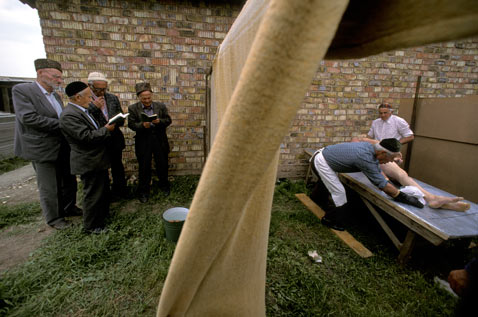
The men of the village wash and wrap the body of Said Abakiyev, 61, to prepare him for burial in the Tartar tradition in Pionerskoye, Crimea, Ukraine, June 1, 1993.
6/1/93 - Simferopol, Crimea, Ukraine We have just had an incredibly long day. It was amazing, sad, emotional, productive and in the end, frustrating and destructive . . . Ready!?! We started at 4:45am in a Tatar village a half hour outside of Simferopol. Today was Kurban Bayrami, a Muslim holiday of sacrifice. I photographed a bull being slaughtered in detail, a feast that followed . . . and then . . . I was able to document a Muslim funeral . . . in detail from the body lying in the house with family grieving, to washing and wrapping the body, to taking it via procession through the village to be buried. These events of ritual slaughter and burial were so raw. . . and the death scene really hit me. Seeing the dead body up close (only my third) and the fact that he was 61, reminded me of my dad. Watching the older daughter wailing and yelling out his name repeatedly made me think of how I didn't have a chance to say goodbye to Dad. When we got to the cemetery, I finished shooting once the body was buried. I decided to just sit with the 30 to 40 men that accompanied the body there. I wanted to show respect to them for having let me into such intimate situations. But also, I wanted to sit on the side of the hill, in the grass, with the sounds of the Imam singing and the vista view and feel, relax, be present . . . It all worked to make me feel quite peaceful about life and death. I really miss you and am getting excited about coming home and seeing you . . . Much love.
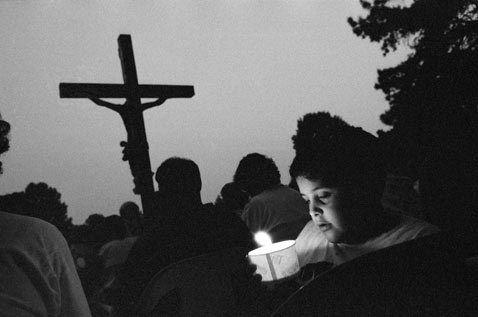
A young Christian reflects during an evening service at Nancy Fowler's farm in Conyers, Ga., May 15, 1995.
5/12/95 - Conyers, Georgia, USA - 8:45am I'm lying in bed in my disinfected room. It's very hot out today. I tried to sleep late, but it's not something I know how to do real well. Wondering what you are doing at the moment. . .and how's little Eli? Dead cockroaches on the walls, no fresh food in the area, my head aches. Is it the disinfectant or the wine from last night? There are no windows in this place. I need fresh air.
I miss you already. I love both of you. Deeply.
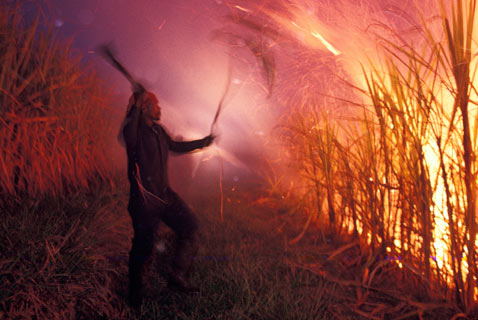
A Zulu man cuts down and burns a sugar cane field after the harvesting season to renew the soil for coming years in the village of Melmoth, Kwazulu-Natal province, South Africa, Sept., 1997.
9/21/97 - Zululand, Africa I am once again facing the demons of a tough fixer, the loneliness of the road and less than perfect conditions. But all my current problems pale when I think about our new baby on the way. I know it was a shock for me when I first got the news that you were pregnant again, but now that we're settled into this new reality, I am jumping out of my skin with excitement. Who knows what we'll have? I know you want a girl this time. I just want a healthy baby.
Today we went out at dusk to photograph the cane fields being burned. It was exciting, and I had a near miss. The hot embers were flying everywhere, and they had these Zulu field workers armed with big sticks to bat the embers down as they tried to fly from the burning field to an adjacent field that was not ready for burning. The consequences of that would be devastating for the farmers. I was on the fire break road that separates the two fields, trying to photograph the Zulu worker swinging at burning embers, when a bunch of them fell down on me. They burned holes in my clothes and caught my forearm and left a small burn mark. It was harrowing for a moment, but I also think I made a compelling image of the scene.
Every night I go to sleep wondering how you're feeling, thinking about your swollen belly and all the magic that's inside. I can't wait to meet our new child. Only a few more months left. I love you so dearly and deeply.
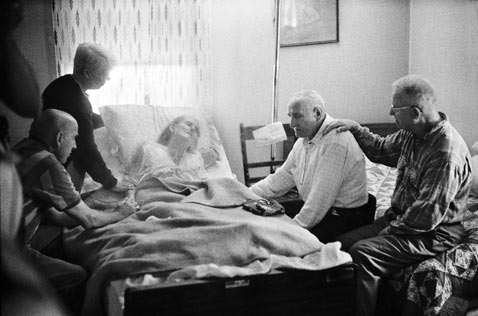
Surrounded by family, friends and hospice aides, Maxine Peters passes away at home in Gladesville, W.Va. on Oct. 9, 2000.
10/13/00 - Gladesville, West Virginia, USA - 8:12am I spent the night sleeping next to Arden [Peters]. More accurately, next to his two piss bottles. The acrid odor permeated each breath through the night, which was fitful at best. Moreover, I spent the night lying in the same place on earth where a woman had died just 24 hours earlier. The thoughts of her soul wandering into the room, wondering what this young man was doing in her place, next to her lifelong companion, frightened me until I could release and fall into unconsciousness. Fortunately, I slept for part of the night without being visited by any lost souls. The sheets and blanket smelled of Maxine and the odors of sickness, care, death and decay.
This morning I walked outside and embraced the fresh smells of the country, the smell of the cows in adjacent fields, and the smells of the dew covered grasses, trees and hillsides. The sun shone brightly as the crisp air made me feel alive, wishing to be with my young children, so full of life, joy, potential . . . sweet smelling. Being here reminds me of the end of life, without any potential . . . only the good nature of Arden and Warren [De Witt] to preserve my spirit.
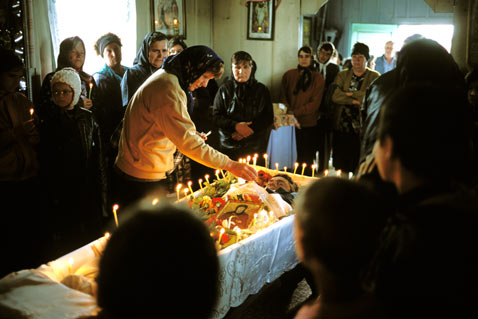
Ethnic Ukrainians mourn the death of an elderly villager at a traditional Eastern Orthodox funeral in the village of Crisan, Tulcea county, Romania on Feb. 17, 2001.
6/12/01 - Danube Delta, Romania My love, I just came back from photographing a funeral in a little Delta village. The man who died was 61. He was walking his herd of cows by the river, collapsed from a heart attack and fell into the surf. He wasn't found for two days. The funeral was very moving for me. Once again, I was heaving with tears and emotions. The scene was so beautiful, with his body in an open casket, candles lit around the periphery of the box, with his family and many members of this small fishing village around. The priest, a Russian Orthodox, prayed and sang, while the people obeyed his commands, crossing themselves at the right moments, approaching the coffin in waves and indulging in the proper mood. Everyone was present, from little children to elders. I broke down in the church, thinking of how beautifully this man's death was being witnessed. The tenderness, ritual and attention to detail was moving (all the pall bearers had cellophane wrapped new shirts pinned to them as an alm from the family). It all made me think how hard we humans try to recognize and respect the possibility of a spiritual world, and even if we are deluding ourselves and a human death is really no different than a dead seagull's unwitnessed passing in the lonely shores of some far-off island, we at least try to create a memory and belief that these acts will make sense and give meaning to it all. It also made me think of my mortality and that it feels too close. In the end, I made some strong images, which helped lift my spirits that maybe something meaningful is being created by all this time away from my family.
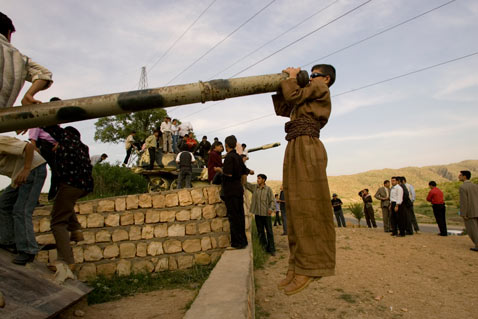
Students from Bahirka, a collective town for displaced people from all over northern Iraq from the Anfal campaign, play on fallen Iraqi tanks in the town of Shera Swars in Arbil, Iraq, April 18, 2005.
4/18/05 - Arbil, Iraq The young recruits were much better outfitted and armed (thanks to the Americans) than when I photographed a similar situation in 1991. They were crisp, attentive and confident. I am trying to get out on patrols and photograph them on duty, at checkpoints, etc. Training shots at this point leave a lot to be desired for me. In general, I am dealing with image and experience fatigue. I've seen and photographed too much at this point in my life and seem to constantly be facing situations I've been in before. It's the visual challenge, but moreover and more importantly, it's the challenge of making it meaningful and being able to find a purpose to the work I'm doing beyond completing an assignment. I am just not the same person I was and am not satisfied as easily. I'm looking for more meaning and purpose to my work. Hopefully, that will reveal itself as I move further into this project.
I ended the day in frustration and just went to sleep in the car. Then as we were driving, I opened my eyes to see two tour buses of school-boys piling out to a monument on a hill of two Iraqi tanks that commemorate a battle that the Pesh Merga won in 1991. I jumped out of the car and hopefully made a cool and meaningful image.
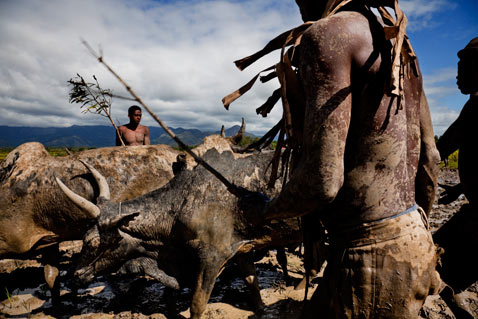
Rice farmers prepare their field for planting by using zebu, or cattle, in Manambaro, Madagascar on Jan. 19, 2010.
1/19/10 - Fort Dauphin, Madagascar We went about 45 minutes outside of Fort Dauphin to photograph mangosy, which is when rice farmers use the zebu (cattle) to mulch their fields so when they plant the baby shoots, they'll more firmly root in the earth. It is a scene of mud flying everywhere and mayhem, as the family and neighbors of the farmer are dressed in underwear and some covered in twigs and bushes, screaming and flailing at the zebu, sometimes jumping on them like cattle rustlers, or like a rodeo, poking them with sticks, all to keep them moving and churning the earth, which is in 2-3 ft of water. So I was completely caked with mud, barefoot with my pants rolled up. I am now finished. Can't wait to see you my sweet.
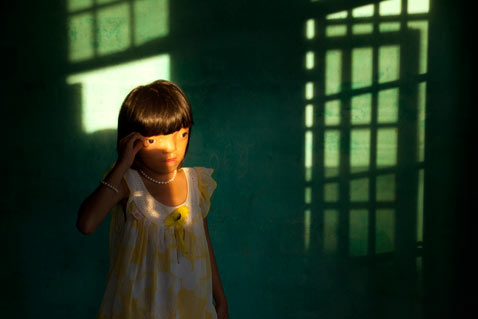
Nguyen Thi Ly, 9, who suffers from Agent Orange disabilities, is seen in her home in Ngu Hanh Son district of Da Nang, Vietnam, July 9, 2010.
7/10/10 Had a good morning of shooting with Ly, the little girl we've covered so far. She went to the hospital for a checkup. Her chest is concave. She'll need surgery, but she's too thin and weak. The doctors told her mom she needs to eat more. Easy for them to say. The spirit of Ly and the love and support of her family were quite lovely to witness. She is a special little girl and will hopefully pull through. Wish I had something more profound to say, but my reserves are empty.
